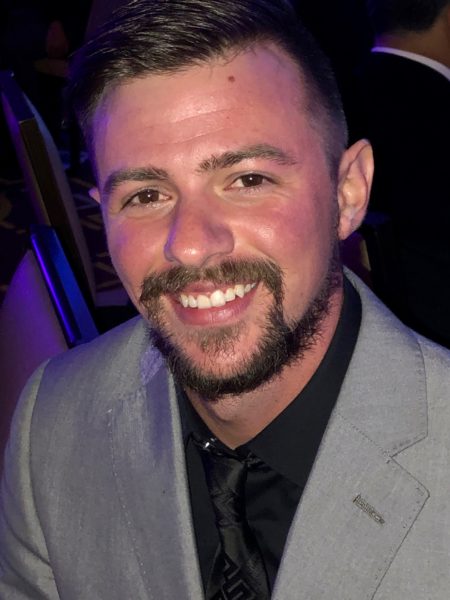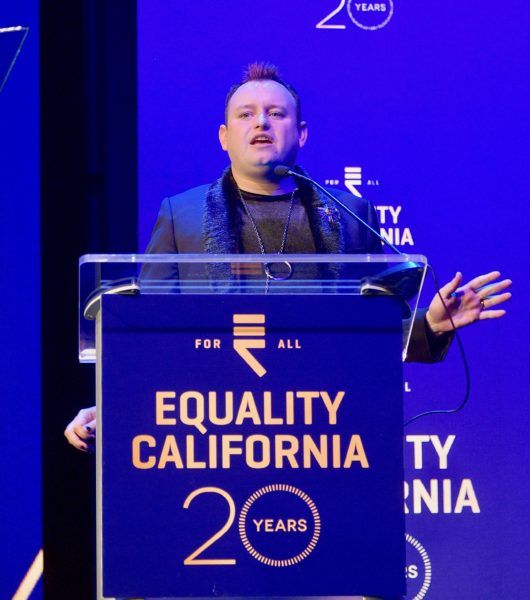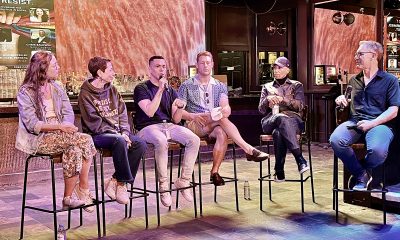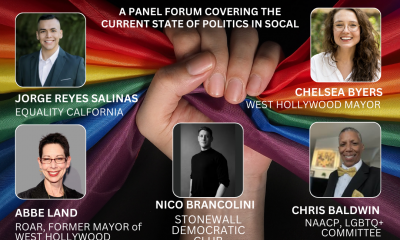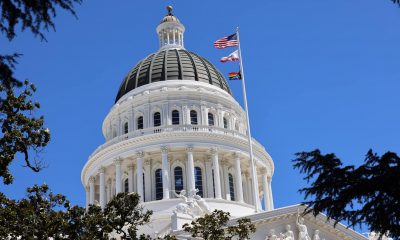Los Angeles
Equality California raises $1 million at 20th Anniversary Gala
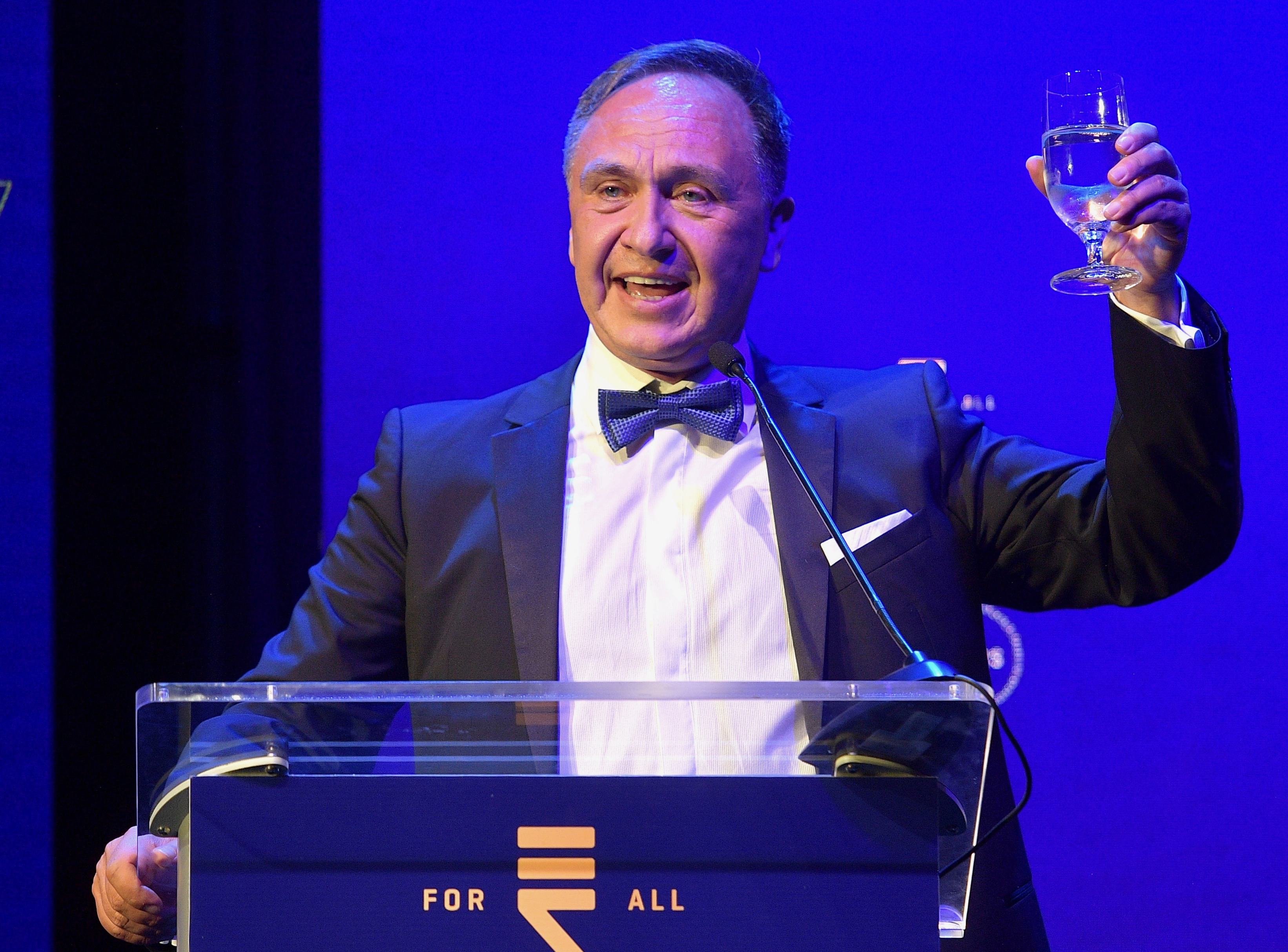
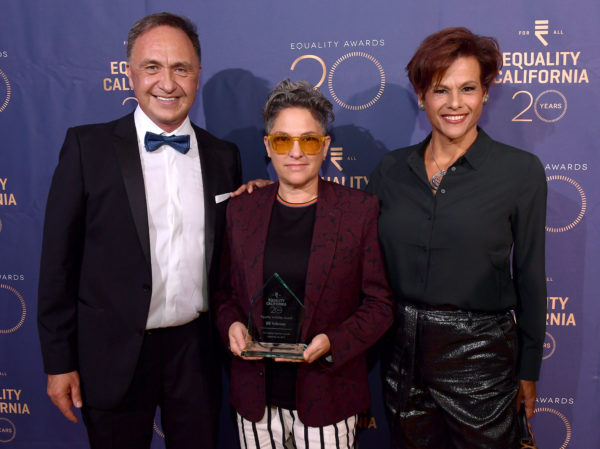
LOS ANGELES, CALIFORNIA – SEPTEMBER 28: (L-R) Rick Zbur, honoree Jill Soloway and Alexandra Billings attend Equality California’s Special 20th Anniversary Los Angeles Equality Awards at the JW Marriott Los Angeles at L.A. LIVE on September 28, 2019 in Los Angeles, California. (Photo by Matt Winkelmeyer/Getty Images for Equality California)
There was something comforting about Equality California’s 20th Anniversary Awards ceremony last Saturday, Sept. 28. The sold-out crowd of 1200-plus people in the JW Marriott/LA Live ballroom not only applauded the notable honorees and the LGBTQ lobbying organization’s successful legislative history but celebrated a political and creative unity that has historically changed American culture in the midst of an unprecedented constitutional crisis.
Transparent creator and new non-binary spokesperson Jill Soloway cheered the “wonderful young TikTokers complaining about their non-binary dysphoria” as she accepted Equality California’s Equality Visibility Award. Introduced by trans activist Alexandra Billings, who will make Broadway history in January taking over the role of Madame Morrible in Wicked, Soloway talked about how “queer and trans people are magic” and noted trans pioneers lost to history whose stories deserve to be told. “I am so privileged to walk this road paved by my transcestors,” Soloway said. The evening closed with a standing ovation for 27-year old trans pop star Kim Petras.
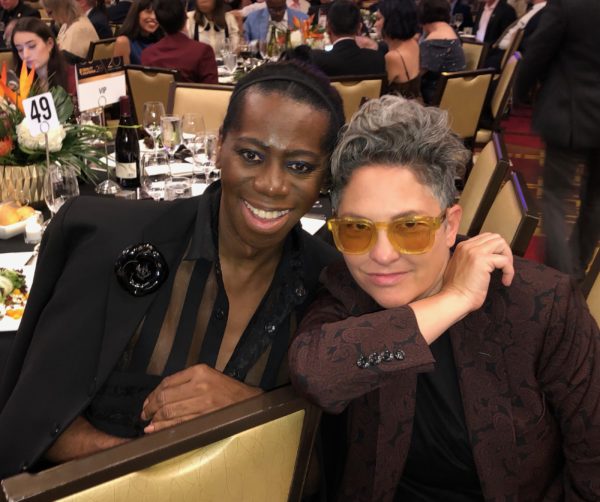
Jill Soloway with runway guru Miss Jay Alexander (Photo by Karen Ocamb)
CNN Republican commentator Ana Navarro served up some red meat, dishing on Donald Trump during her Ally Leadership Award acceptance speech after a saucy appetizer. “I said to Gloria [Estefan]: ‘Do you think I should wear these shoes?’” recounting her getting ready for the gala. “And she said: ‘Are you going like that? You don’t have hair and makeup? Really, you’re going to a gay event?’”
Navarro went ten minutes beyond her allotted five minutes, riffing on her gay friends, on how getting an award for supporting LGBTQ people was like “getting a straight man an award for peeing inside the toilet bowl instead of the sink” and describing green costumed Sean Spicer on “Dancing with the Stars” during Hispanic Heritage Month as “a florescent parakeet dancing salsa. That’s a damn sacrilege.”
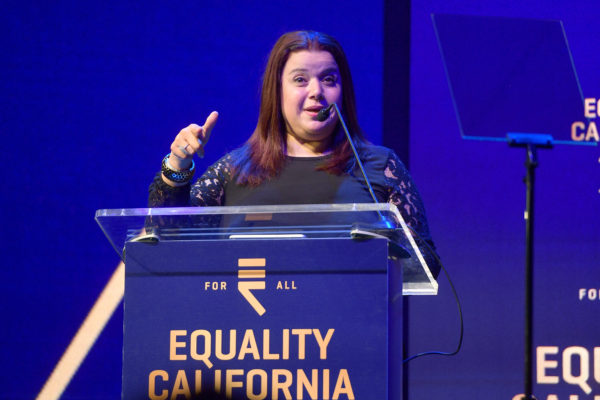
LOS ANGELES, CALIFORNIA – SEPTEMBER 28: Honoree Ana Navarro speaks onstage during Equality California’s Special 20th Anniversary Los Angeles Equality Awards at the JW Marriott Los Angeles at L.A. LIVE on September 28, 2019 in Los Angeles, California. (Photo by Matt Winkelmeyer/Getty Images for Equality California)
But Navarro got serious, too, saying she “didn’t grow up feeling threatened by or superior to people that were different from me in some superficial way. I was not taught that in order to feel accepted and strong, I had to make others feel weak and illegitimate. For me? Prejudice against the LGBTQ or any group is about ignorance and insecurity and political gain. That’s the worst part. When people who know better are fanning the flames of prejudice against other people in order to win elections.”
It used to be “embarrassing to be a bigot,” Navarro said. “But in the last few years, bigots have come out of the closet.”
The need to defend LGBTQ rights is a reality. “Bigotry, it’s like shoulder pads or bell bottoms—it’s an ugly trend that really should never come back, but it does. And it’s name is Trump,” Navarro said. “But actually, I should refer to it as public, outward, institutionalized bigotry. That’s the real problem we have right now, it’s institutionalized. It is coming from the government, from the federal government. The people who don’t want to light up the White House with pride colors on Pride Month. The people who give an order to embassies to not raise a pride flag during Pride Month. That’s institutionalized discrimination. And that’s very purposeful, and very strategic.” She vowed to always remain an ally.
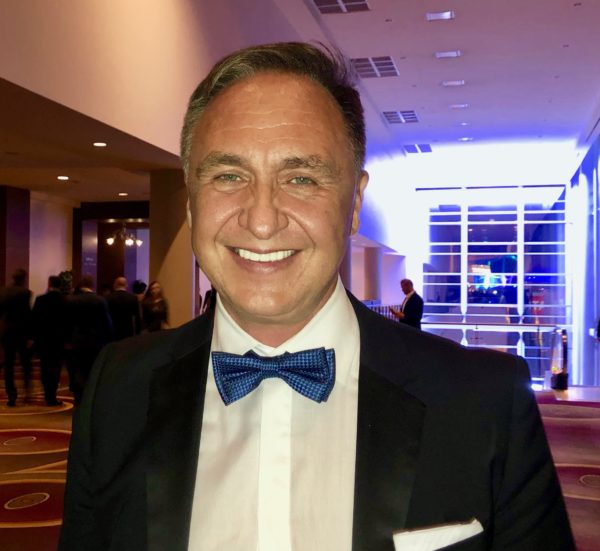
Equality California Executive Director Rick Zbur (Photo by Karen Ocamb)
But in some ways, the 20th anniversary was crystalized by Equality California executive director Rick Zbur. The longtime political activist and environmentalist retired from Latham & Watkins in 2014 as an out senior partner after practicing law there for decades. But his long association has been fortuitous: Latham & Watkins contributed almost $3 million in pro bono services for the last three years, including work on the Safe And Supportive Schools Program and representing Equality California in its Stockman v Trump federal fight against Trump’s transgender open military service ban for which Amy Quartarolo and her team received the Community Leadership Award.
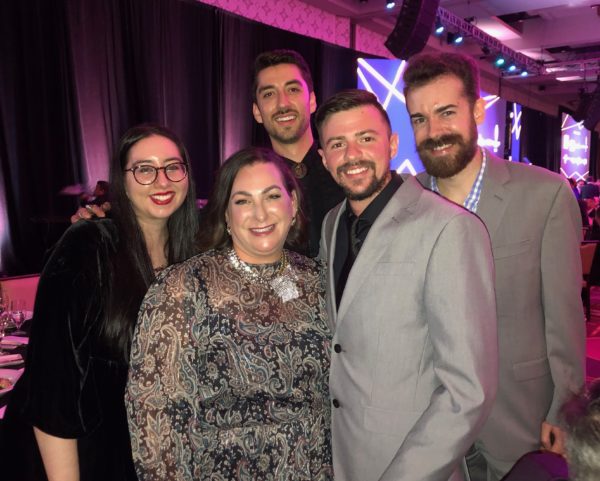
Amy Quartarolo and her Latham & Watkins team with plaintiff Nicolas Talbott (Photo by Karen Ocamb)
The award was presented by plaintiff Nicolas Talbott from Lisbon, Ohio who recounted his dream deferred by bigoted politics. Talbott shared:
“Growing up, I always wore boys clothes and wore my hair short, and I knew that I was transgender before I even knew what that word was. The other thing that I’ve always known is that I wanted a career that would enable me to serve my country and to protect people. So I looked into the ROTC program at Kent State University where I went to college and I decided to pursue a career in the military.
After graduating, I contacted several military recruiters, but they told me I would not be permitted to enlist simply because I am transgender. So, without the military as an option, I had to support myself and my grandmother with whatever jobs I could find, which included being a bus driver, an operations manager, and a truck driver, but I still hoped to enlist one day.
Then in June 2016 when I got a call from a friend who said the ban on transgender military service had been lifted, I was thrilled. The Obama Administration’s decision to lift that ban told me and the transgender Americans across the country that we were worthy of serving our country, that we would be valued and supported like any other service member.
But as powerful as that message was, so too was President Trump’s tweet just a little over a year later, which told me that I would no longer be allowed to serve. So alongside Equality California and six other transgender Americans, I joined one of four lawsuits to challenge this unfair, unconstitutional ban, which brings us to tonight, where I now have the chance to say thank you to Amy Quartarolo and to Latham & Watkins, both of whom so generously made that happen.”
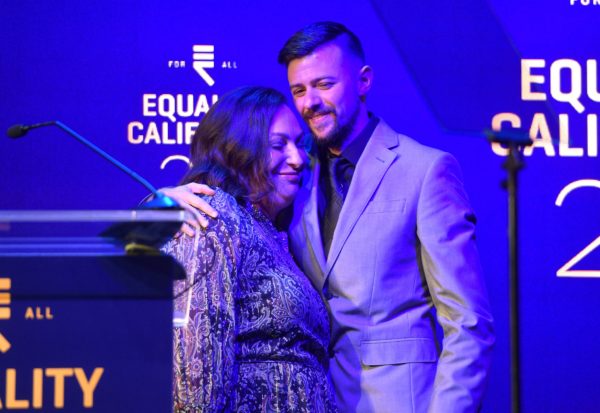
Talbott, Amy Quartarolo said, accepting her award, “is the real superstar of the story. We are just the lawyers” of the “brave” plaintiffs.
“We have seen hope, and we have seen incremental victories. But we have also faced many challenges, and truly have gained an understanding of just how many obstacles remain,” Quartarolo said. “Importantly, we understand that with every one of those challenges, there is a new opportunity, and a renewed chance for commitment.”
In a powerful and moving speech, attorney Andreas Meyer, the President Emeritus of Equality California who formulated the organization intersectionality strategy, outlined a particular challenge that thoughtful LGBTQ advocates may overlook if dulled by what Michelangelo Signorile called “victory blindness.”
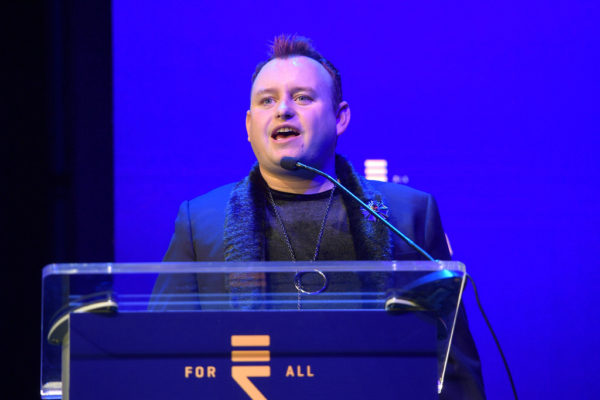
First honoring those who were lost to AIDS and “the thousands of LGBTQ people who continue to lose their lives every year to acts of intolerance and hate,” Meyer articulated a threat the LGBTQ community has not yet fully tackled. Here’s an extended excerpt:
“I believe we are faced at this particular moment in time with the great war of our movement. Our enemy has become more cunning than ever. He’s cloaked himself in our rhetoric of tolerance and civil rights and in the same breath incriminates us with false cries of religious persecution. And he is persuasive.
Even here in California, the forked tongue of our nemesis has planted seeds of doubt in the minds of ourselves and our allies. I experienced the effect of our enemy’s guile just two days ago during a board meeting at the Orange County Fairgrounds. I introduced a draft policy for the board to consider that would prohibit the Fairgrounds from entering into agreements that do not include nondiscrimination language.
I proposed this policy after learning that in 2018 the Fairgrounds had granted $75,000 to an institution with a long history of discrimination against our community. The OC Fair Board is almost entirely comprised of compassionate allies of our community, and the proposed policy was at first received positively.
But then the devil cracked open the door and whispered in our ears—‘wouldn’t this measure go too far?’—he asked. Wouldn’t we be prejudicing the free exercise of religion? Is it lawful to exclude those who have sincere religious beliefs about the sinful and abominable character of homosexuals? Doubt even crept into my own mind as these whispers craftily persuaded me that perhaps the policy was not necessary.
Surely, the managers of the Fairgrounds had heard the message loud and clear about the importance of nondiscrimination. Faced with conflict with my allies and desperate as I’ve always been like so many of us for acceptance, I withdrew the proposal.
In the two days since that meeting, I have reproached myself for letting the fog of war cloud in my mind. The answer to all those questions was simple: if an institution will not agree to conduct its activities on State property or using State funds in a nondiscriminatory manner, then it has no business conducting its activities on State land or using State resources.
Andreas Meyer (Photo by Matt Winkelmeyer/Getty Images for Equality California)
I wish I would have asked myself harder these questions during the meeting. Does that go too far? No. Does it prejudice the free exercise of religion? No. Is it lawful to exclude those who have sincere religious beliefs about the sinful and abominable character of homosexuals? If it isn’t, then it should be and we should not go down without a fight.
In accepting this award tonight, I can promise you that I will not back down again. I will not compromise. And I will be not be told that our civil rights are an overreach. Because we are at war and we must sound the alarm. Our fight is not just a fashionable political issue, but rather a struggle for our very survival.
Those of us gathered here, the privileged and the blessed, must not forget where we came from. Even though it’s painful, we must constantly remind ourselves of the dark and unshakeable terror of physical violence, social exile and criminal prosecution that lurks in our recent past and which continues to torment our brothers and sisters across the country and around the globe.
And let’s not be fooled: our enemy would see us go back to that place. But we will not let him win. And our sacrifices will nourish the flowers of our future, the hope, and the birthright of our community. For we have been patient. We have been tolerant. We’ve learned the difficult lessons. And so the legendary children shall inherit this earth.”
Zbur drove home that deep commitment to full equal rights for LGBTQ people. He framed Equality California’s historical mission courageously leading on marriage equality enabling lesbian pioneers Del Martin and Phyllis Lyon to marry in 2004 and again, after winning in In Re Marriage, in 2008 before Prop 8 passed. He also talked about working with state legislators to pass protections for transgender students, a law enabling trans and non-binary folks to up update their official state gender markers, banning so-called “conversion therapy,” sparking a nationwide movement to end the psychologically harmful practice and working beyond the California borders in with a new program in Nevada and on the immigration issue, including helping those seeking asylum—as well as having one of four lawsuits challenging the transgender ban and “all we’ve been dealing with” since Trump’s Electoral College victory on Sept. 6, 2016.
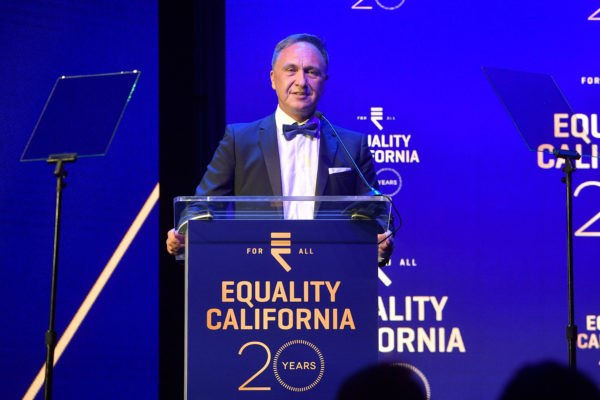
LOS ANGELES, CALIFORNIA – SEPTEMBER 28: Rick Zbur speaks onstage during Equality California’s Special 20th Anniversary Los Angeles Equality Awards at the JW Marriott Los Angeles at L.A. LIVE on September 28, 2019 in Los Angeles, California. (Photo by Matt Winkelmeyer/Getty Images for Equality California)
“Yes, we face threats from the White House and an administration that’s hell bent on rolling back the progress we’ve achieved. But at every turn we keep moving forward because we in California have a special role in leading this movement – and doing so boldly. As my friend Congressman Mark Takano likes to say: ‘We’re here, we’re queer and we’re Californians,’” Zbur said. “We cannot and we will not rest knowing that members or our community or the diverse communities to which we belong don’t have full lived equality.”
Echoing the late Harvey Milk, Zbur said, “Still, with so much work ahead of us, I have hope” because “we Californians have the courage and will to do it” until the work is done.
Then, sounding like an activist parent during the 1960s civil rights movement, or paraphrasing the Crosby, Stills and Nash song about teaching your children well, Zbur shared how the core principles of equality and social justice have been inculcated into his 10-year old twin boys, Ryan and Raffa.
“They came home from school a few months ago and they were complaining. Their homework was stupid. The school was stupid. The fact that they weren’t allowed to talk about Donald Trump in their classroom was stupid. And I looked at them and honestly, I was a little bit surprised. I turned to them and I said, you know, Raffa and Ryan, we’re not a family of complainers. If you don’t like something, go do something about it.
Well, the next thing we’re being called by their principal’s office because Ryan and Raffa decided they were going to circulate a petition and when they didn’t get what they demanded, they decided they wanted to organize a walk out of their fourth grade class.
Half of me was thinking, ‘this isn’t really what I had in mind when I said go do something about it.’ But the other half of me was filled with pride. And when they complained later on that they were punished for fighting back against what they perceived to be super extreme injustice, and after explaining that It doesn’t quite wok that way in school, I explained to them that most people are punished for fighting injustice and that during the civil rights movement, the freedom fighters who marched on Selma were beaten and jailed and even worse. And Dr. King said, ‘freedom is never voluntarily given by the oppressor. It must be demanded by the oppressed.
Or as Speaker Pelosi says, ‘No one gives you power. You have to take it from them.’”
Zbur hopes that the next generation of leaders “don’t give a damn what the cynics have to say.”
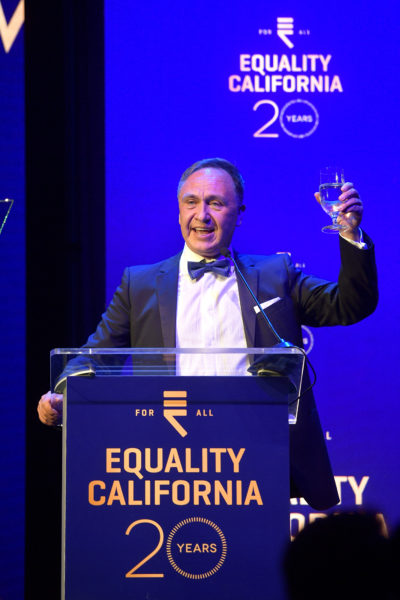
Rick Zbur (Photo by Matt Winkelmeyer/Getty Images for Equality California)
So, Zbur concluded with a flare of positivity, “let’s make a toast to them, to all of you, and to us collectively, to 20 years leading the Golden State’s fight for LGBTQ civil rights and social justice on to the next 20 years of striving to create a world that is healthy, just and fully equal for all LGBTQ people—until the work is done.”
Zbur later told the Los Angeles Blade that the gala had raised $1 million and counting.
Please note: this story has been updated to correct some mishearing of words in the remarks by Andreas Meyer.
California
Williams Institute reports impact of deportations on LGBTQ immigrants
Latest report suggests transgender, nonbinary and intersex immigrants face significantly higher safety risks
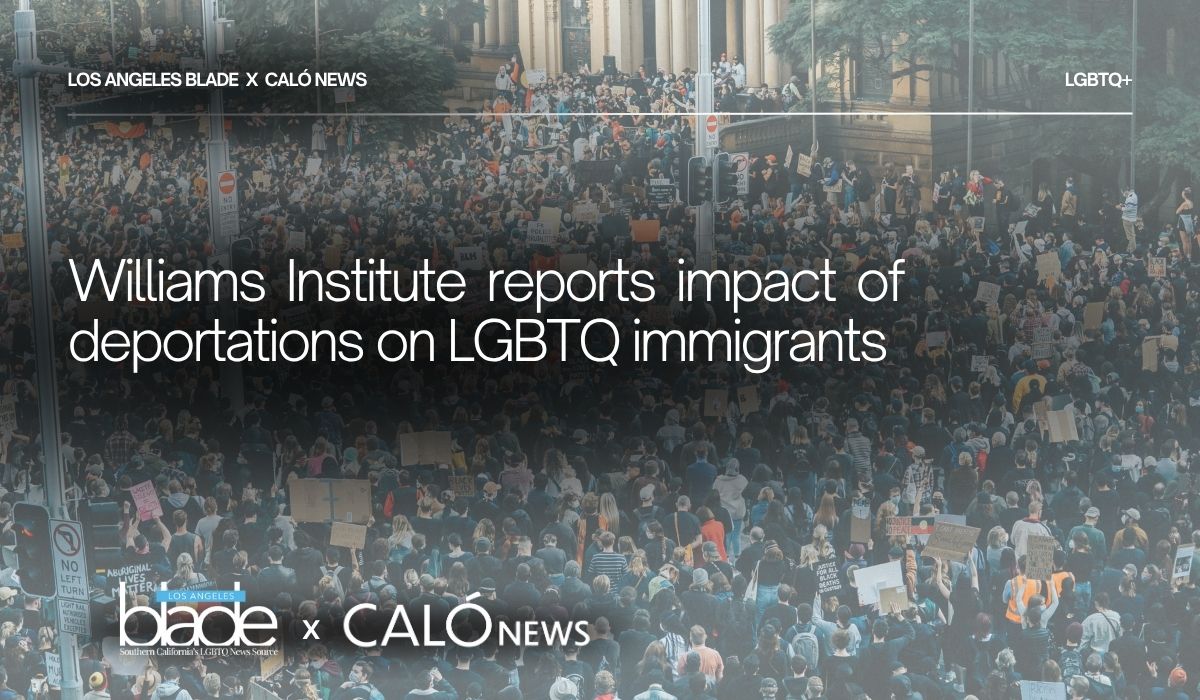
Williams Institute at UCLA has released its latest report, highlighting the intersection between LGBTQ and immigration issues and the impact of the U.S. Customs and Immigration Enforcement (ICE) raids across Los Angeles on LGBTQ people.
According to the brief, LGBTQ immigrants who hold legal status, but who are not naturalized citizens may also face challenges to their legal right to reside in the U.S.
Recent reports indicate that non-citizens with legal status are being swept up in immigration operations and several forms of legal status which were granted at the end of the Biden administration are being revoked. Those include: Temporary Protected Status (TPS) for some Venezuelan immigrants, as well as those from Afghanistan and Cameroon, while Haitian nationals are now facing shortened protection periods, by up to six months.
The Justice Department has proposed a new rule which grants the government border authority to revoke green card holders’ permanent residency status at any time. This rule is currently under review by the Third Circuit Court of Appeals, which could significantly affect non-citizens who are currently documented to reside in the county legally.
Supervisorial District 1, under Supervisor Hilda L. Solis, and Supervisorial District 2, under Supervisor Holly J. Mitchell would particularly be affected as it contains the city center of Los Angeles and nearly 29,000 LGBTQ, noncitizens would face the harshest impact. Those two districts contain many of the county’s historically Black, Latin American and Asian, Pacific Islander neighborhoods.
For transgender, nonbinary and intersex immigrants arrested or detained by ICE, there are additional impacts regarding how federal law defines biological sex and gender identity. The Trump administration has signed an executive order which redefines “sex” under federal law to exclude TGI individuals. This adds an extra thick layer of possible violence when TGI individuals are placed in detention centers or in holding that does not correspond to their identity.
According to the report, ‘transgender, non-binary, and intersex immigrants must navigate an
immigration and asylum system without information about how federal agents will respond to their gender identity and with the risk of greater violence if placed in detention centers, given the effects of this executive order.’
The brief estimates the number or foreign-born adults in Los Angeles County who will be potentially affected by the Trump administration’s executive orders on mass deportations.
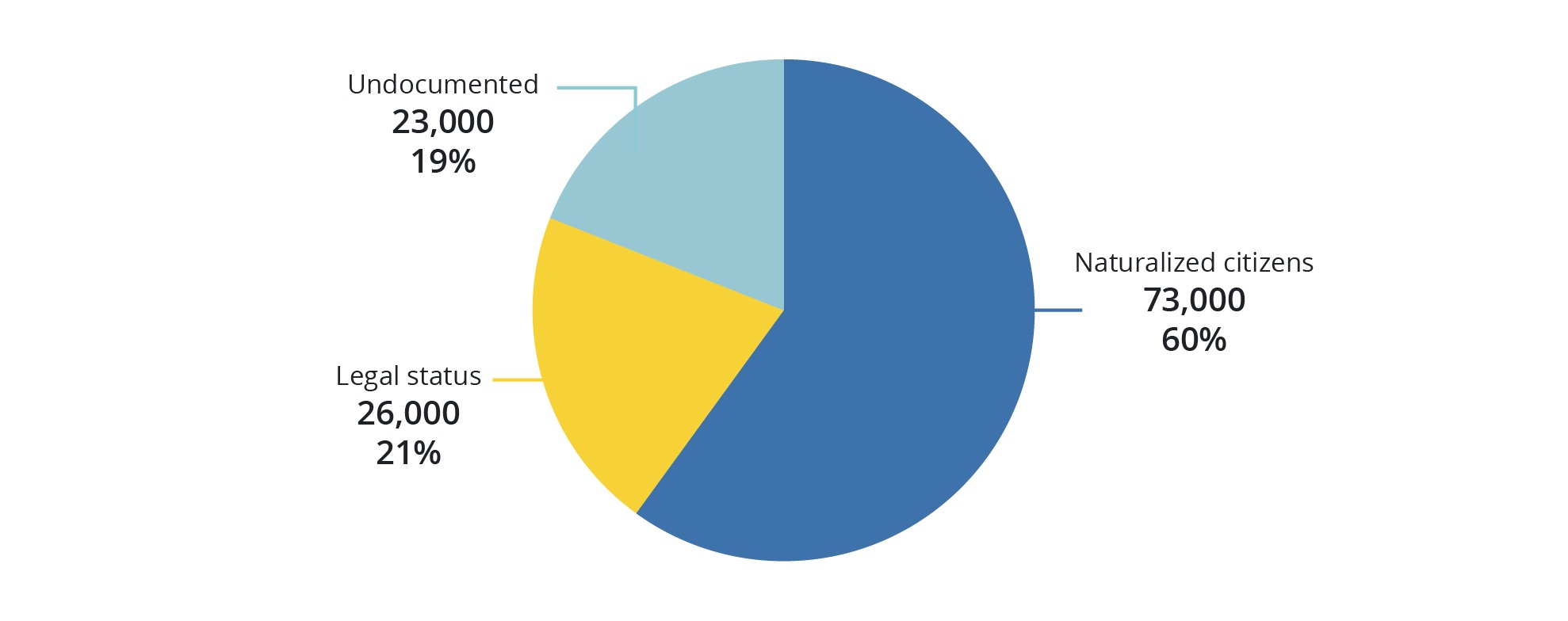
Graphic courtesy of Williams Institute at UCLA.
Using previous data from other Williams Institute Studies and reports from the University of Southern California Dornsife Equity Research Institute and data from the Pew Research Center, the latest brief states that there are over 1.35 million LGBTQ-identifying people across the U.S., with 30% of them residing in California.
The report further points to 122,000 LGBTQ immigrants who reside within LA County specifically, making Los Angeles County home to about 10% of all LGBTQ adult immigrants in the U.S.
While 18% of those Angelenos are foreign-born, only around 7%, or 49,000 of them do not hold legal status.
Using research from the Pew Center and applying an estimate, that means that there are approximately 23,000 undocumented LGBTQ across LA County and the remaining 26,000 LGBTQ immigrants in the county have some form of legal status.
Among the LGBTQ population of adult immigrants in California, approximately 41,000 are transgender or nonbinary. That figure also points toward approximately 5,200 of them residing in LA County. According to the proportions applied for this estimate, the Williams Institute approximates that around 3,100 transgender and nonbinary immigrants in LA County are naturalized citizens, over 1,100 have legal status and just under 1,000 are undocumented.
According to a brief released in February by the Williams Institute, ‘mass deportations could impact 288,000 LGBTQ undocumented immigrants across the U.S.
Los Angeles
LA Black Pride: ‘We are no longer waiting to be seen’
Joy as power, presence as protest, visibility that refuses to be diminished
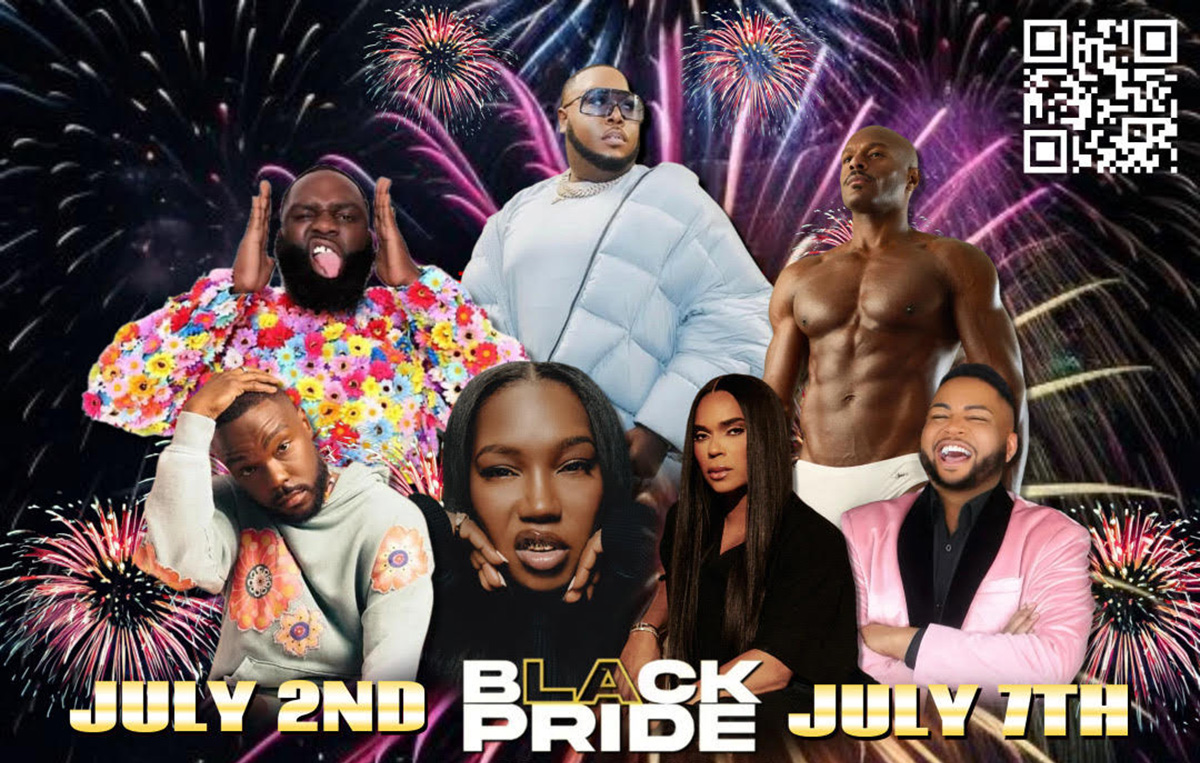
As Los Angeles Black Pride (LABP) gears up for another saucy season of celebration, culture, and resistance, we are proud to announce a new six-week media partnership between LABP and the Los Angeles Blade. This collaboration is not just promotion but intention. It is about making sure Black queer voices are not just heard, but honored and amplified.
To kick it off, we are excited to announce that Saucy Santana will headline LABP’s Saturday night main stage. Known for their unapologetic energy, queer-centric bops, and fearless showmanship, Santana represents exactly what LABP is about — joy as power, presence as protest, and visibility that refuses to be diminished.
The theme for LABP 2025 is “Black Queer Futures Are Now: We Are No Longer Waiting to Be Seen.” Our partnership sets the tone for what’s to come. It is a shared commitment to telling Black queer stories, past and present, and investing in what’s to come.
What started as a party born out of necessity has now become a full-scale movement. LABP Executive Director Brandon Anthony, who began his journey throwing parties like Ice Cream Thursdays, recounts the roots of this project:
“It started off as something I felt was missing… a space that felt like us: where the music hit right, where the energy felt familiar, and where we could just be,” he says. “What began as a vibe we needed grew into a platform. Now, it’s a business, a brand, a movement, but at the heart of it, I’m still just someone who wanted to create space for my community to feel good, feel seen, and feel proud.”
From nightlife to nationwide recognition, LABP is proof that when Black queer folks create for themselves, the result is not just representation, it’s revolution. In a landscape where many Pride events still sideline Black and Brown voices, LABP has become a necessary act of reclamation.
“Because if we don’t, who will?” Anthony asks. “Too often we get left out or placed in the background. Our energy, our style, our voices — we drive the culture. When we center ourselves, it gives others permission to do the same. Joy is more than a feeling, it’s a form of resistance.”
That resistance has never been more needed. From limited funding to systemic erasure, LABP continues to thrive against the odds. But the message is clear: thriving should never necessitate struggle.
“We’re not just asking for visibility — we’re asking for the tools to thrive,” he explains. “Now more than ever, we need partners who are aligned with the people, not just the optics.”
With the 2025 theme of “Legacy and Leadership in Action,” LABP honors the trailblazers who paved the way. Icons like Jewel Thais-Williams, founder of the legendary Catch One, are celebrated annually through the Jewel Thais-Williams Award.
“Catch One wasn’t just a nightclub, it was a safe haven,” Anthony shares. “Legacy isn’t just about the past. It’s about lifting up the folks doing the work right now and keeping that energy alive.”
LABP continues that work through programming that extends far beyond June. Year-round initiatives include pop-up markets, health services, creative workshops, and political advocacy.
“One of the moments that really showed what we stand for was the All Black Lives Matter march in 2020,” he says. “We co-led it alongside Gerald Garth, and it was powerful to see thousands show up for Black Trans lives. That wasn’t just a moment – it was a movement.”
Whether it’s showcasing emerging artists on stage, uplifting Black trans creatives, or building platforms for new leaders, LABP is focused on making sure the next generation has room to grow.
“When people are given a platform to show what they can do, it creates more than visibility, it creates momentum,” he says. “That’s what keeps everything moving forward.”
And with names like Saucy Santana taking center stage, that movement is gaining speed. Santana’s headlining performance isn’t just a concert — it’s a declaration. It says that Black queer talent is main-stage worthy, every time. This partnership is not performative – it’s purposeful. It’s a bridge between platforms, audiences, and shared values.
“LA Blade has a huge reach, and by choosing to amplify Black queer voices, they’re helping bridge gaps and build deeper understanding,” says Anthony. “This isn’t about charity or tokenism. It’s about showing the world who we are, what we’re building, and why it deserves to be seen.”
In the words of LABP’s ongoing mission: We are no longer waiting to be seen. We are building what’s next.
a&e features
Cumbiatón returns to Los Angeles right in time for Pride season
‘Que viva la joteria,’ translates roughly to “Let the gayness live”

Healing and uplifting communities through music and unity is the foundation of this event space created by Zacil “DJ Sizzle Fantastic” Pech and Norma “Normz La Oaxaqueña” Fajardo.
For nearly a decade DJ Sizzle has built a reputation in the queer POC and Spanish-speaking undocumented communities for making the space for them to come together to celebrate their culture and partake in the ultimate act of resistance — joy.
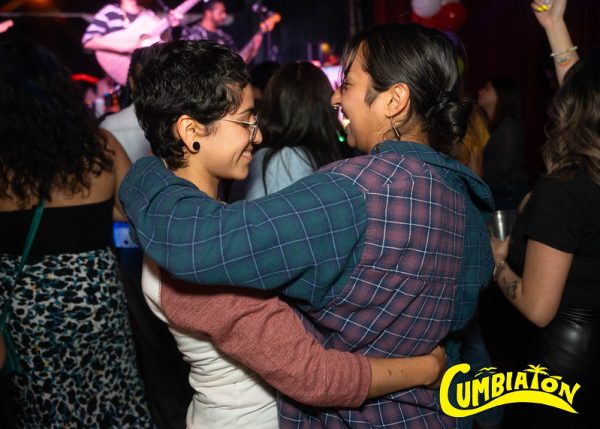
Couples, companions, comadres all dance together on the dancefloor at Cumbiatón. (Photo courtesy of Cumbiatón).
Cumbiatón was created during the first Trump administration as a direct response to the erasure, racism, homophobia and xenophobia that was engrained into the administration’s mission for those first four years. Now that the second Trump administration is upon us, the racism, homophobia, transphobia and xenophobia are tenfold.
This event space is a ‘party for the hood, by the hood.’ It is led by women, queer and trans people of color in every aspect of the production process.
The recent fires that burned through Altadena and Pacific Palisades made DJ Sizzle decide to step back from marketing the event in Los Angeles, an area where people had just lost their businesses, homes and where their lives were completely thrown for a loop.
Now they’re back, doubling-down on their mission to bring cumbias, corridos and all the music many of us grew up listening to, to places that are accessible and safe for our communities.
“I started Cumbiatón back in 2016, right after the election — which was weirdly similar because we’re going through it again. And a lot of us come from the Deferred Action for Childhood Arrivals (DACA) movement. We were the ones to really push for that to happen along with the DREAM Act.”
DJ Sizzle says that she wanted to create a space out on the streets to celebrate life and come together, because of how mentally and physically taxing it is to be a part of the marginalized communities that were and still are, a major target for ongoing political attacks.
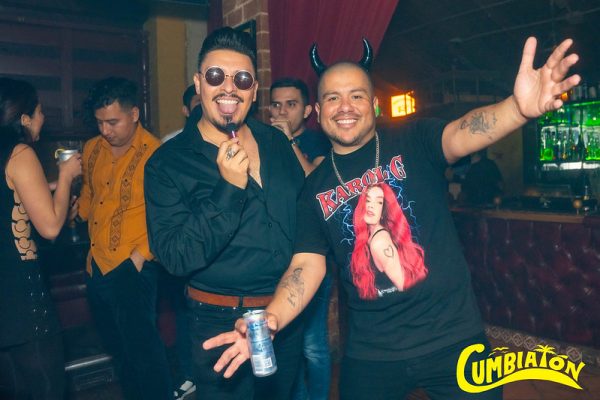
Edwin Soto and Julio Salgado pose for a photo at a Cumbiaton event in 2024. (Photo courtesy of Cumbiatón).
“We need these spaces so that we can kind of refuel and rejoice in each other’s existence,” said DJ Sizzle. “Because we saw each other out on the street a lot, but never did we really have time to sit down, have a drink, talk, laugh. So I found that music was the way to bring people together and that’s how Cumbiatón got started. It was honestly like a movement of political resistance through music.”
DJ Sizzle is an undocumented community organizer who aims to not only bring awareness to the issues that her communities face, but also to make space to celebrate the wins and bond over the music that brings people in Latin America, East L.A., Boyle Heights and the Bay area together.
Julio Salgado, a queer, visionary artist and migrant rights activist from Ensenada, Baja California with roots in Long Beach and the Bay Area, connected with DJ Sizzle over their shared passion in advocating for immigrant rights.
“Cumbiatón was created during the first [Trump] administration, where you know, a lot of people were really bummed out and so what Sizzle wanted to create was a place where people could come together and celebrate ourselves,” said Salgado. “Fast-forward to the second [Trump] administration and we’re here and feel a little bit more like: ‘oh shit, things are bad again.’ But, things have always been bad.”
Salgado is involved with Cumbiatón through his art. He is a mixed-media artist who creates cartoons using his lived experience with his sobriety journey, undocumented status and queer identity.
With a background in journalism from California State University, Long Beach, Salgado documents what activists do in the undocumented spaces he has been a part of throughout his life.
In 2017, Salgado moved back to Long Beach from the Bay Area, and at the time he started doing political artwork and posters for protests against the first Trump administration, but because the nature of that work can be very tiring, he says that he turned to a more uplifting version of his art where he also draws the joy and unity in his communities.
When he and Sizzle linked up to collaborate during that time, he thought he could use his skills to help uplift this brand and bring it to the forefront of the many events that saturate the party landscape.
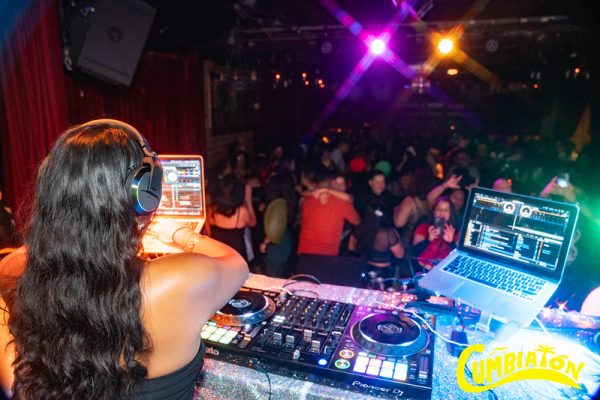
DJ Sizzle doing her thing on stage, giving the crowd the music they went looking for. (Photo courtesy of Cumbiatón).
“We are familiar with using the dance floor as a way to kind of put the trauma a little bit away just for one night, get together and completely forget,” said Salgado.
Coming from an undocumented background, Salgado and Sizzle say that their experience with their legal status has made them very aware of how to go about the ID-check process at the door for their events.
“When you’re undocumented, you have something called a [High Security Consular Registration (HSCR)] and it’s kind of like your ID and many of these heterosexual clubs would see that and say it was fake,” said Salgado. “But at the gay club, they didn’t care.”
Just being conscious of what that form of ID looks like and knowing that it’s not fake, helps many of the hundreds of people who come through for Cumbiatón, feel just slightly more at ease.
Edwin Soto, who is another community activist and leader in the undocu-queer community, is also involved in the planning and organizing of the event.
In the long journey of making Cumbiatón what it is now, they say that they have all been very intentional about who they bring in, making sure that whoever they are, they also understand the experience of being undocumented and accepted anyway.
“Something that Sizzle and the team have been very intentional about is making sure that [the security at the door] knows that someone might be using their consulate card,” said Soto.
Bringing together this event space is no easy task, considering the fact that their events are deeply thought out, intentional and inclusive of not just people of color, but also people with differing abilities and people who do not reflect the norm in West Hollywood clubs.
“We created the space that we were longing for that we did not see in West Hollywood,” he said. “[Cumbiatón] is what life could really be like. Where women are not harassed by men. Where people are not body-shamed for what they’re wearing.”
When it comes to their lives outside of Cumbiatón and partying, Sizzle says that it does get exhausting and planning the event gets overwhelming.
“It is really difficult, I’m not going to lie,” said DJ Sizzle. “We are at a disadvantage being queer and being undocumented because this administration triggers us to a point that, anyone who is not a part of those identities or marginalized communities would ever be able to understand,” said Sizzle. “There are times where I’m just like: ‘I’m going to cocoon for a little bit’ and then that affects the marketing and the communication.”
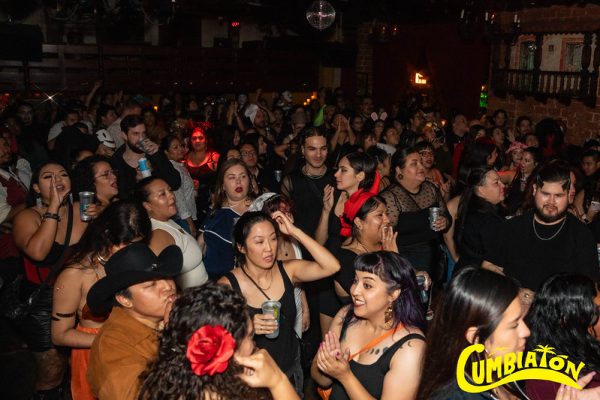
Usually, the events bring in hundreds of people who are looking for community, safety and inclusion. (Photo courtesy of Cumbiatón).
That’s a little bit about what goes on behind the scenes — which really shouldn’t come as a surprise for anyone who is out there fighting for basic human rights, while also making the space to party and enjoy themselves.
“I’m really trying to find balance and honestly my life raft are my friends and my community,” she said. “Like, being able to share, being able to have this plática, and be like ‘bitch, I see you and I know its fucked up, but we got each other.’”
Cumbiatón was made with the purpose of making space to include and invite the many different people in these communities who are otherwise sidelined in broader conversations and in party scenes where they are not as inclusive or thoughtful about their attendees.
“How beautiful is it to be queer and listen to rancheras and to norteñas and cumbia, and to just own it,” said Soto.
To join Cumbiatón at their next party, visit their Instagram page.
California
LA Pride 2025 announces grand marshals and parade theme
The parade will also pay tribute to the city’s first responders, relief organizations, agencies, officials and others who stepped up during the January fires

The theme for the parade set to take place on Sunday June 8, at 11 a.m., will fittingly be “Pride Marches On,” and this year’s parade grand marshals will be Niecy Nash-Betts and wife Jessica Betts, Andrew Rannells, and Trino Garcia and Adam Vasquez, who are also known as ‘TrinoxAdam.’
Rannells, a Grammy-winning, two-time Tony-nominated actor celebrated for his work on stage, screen, and television, is this year’s LA Pride Celebrity Grand Marshal.
“I’m truly honored to be this year’s Celebrity Grand Marshal of LA Pride,” said Rannells. “I don’t take it lightly and I just hope in some small way I can reflect the strength and resilience of the queer community, especially in times like these.”
Rannells made his TV directorial debut with Amazon’s “Modern Love” and is widely recognized for his role as Elijah Krantz on HBO’s “Girls,” which garnered a Critics Choice nomination. He recently appeared on Hulu’s “Welcome to Chippendales” and Showtime’s “Black Monday,” earning him yet another Critics Choice nomination. Rannells is also an author, director and Broadway actor.
Nash-Betts, one-half of this years Vanguard Marshals, is a multi-talented Emmy Award-winning actress, producer and director who has captivated audiences on many projects across the big screens. Soon, she will be making a big appearance starring opposite Kim Kardashian, Naomi Watts, Sarah Paulson, Teyana Taylor and Glenn Close, in Ryan Murphy’s “All’s Fair” Hulu TV series about an all-female legal firm.
Chicago native Betts will join her wife Nash-Betts as the other half of this years Vanguard Grand Marshal’s of the parade. Betts is an acclaimed singer-songwriter known for her original electric and acoustic rock and soul music. The two have been married since 2020 and in 2022, they made history as the first same-sex couple to grace the cover of Essence magazine, receiving a nomination for a GLAAD Media Award.
“We are thrilled to have Niecy Nash and Jessica Betts as this year’s Vanguard Grand Marshals,” said Gloria Bigelow, CSW board member. “As individuals and as a couple, they exemplify the beauty of living authentically and embracing love in all its forms. Their presence serves as a shining example for our community, reminding us to celebrate who we are, love fiercely and never back down from our Pride.”
TrinoxAdam will be this years Community Grand Marshals. The two are a loving gay couple who have dazzled the queer, Latin community with their content showcasing how they reclaim the cholo, or ‘xolo’ identities. They went viral on social media after sharing a romantic kiss on a bridge overlooking the 110 Freeway in Los Angeles. Now famous on social media, the two make content about their love, challenging traditional perceptions of masculinity, sexuality and Chicano culture.
“Pride is about loving yourself and accepting yourself for who you truly are,” said Trino Garcia and Adam Vasquez. “Being this year’s LA Pride’s Community Grand Marshals is the biggest honor and our greatest accomplishment, knowing we’ve made an impact and helped people find acceptance within themselves and finally feel the true meaning of Pride.”
This year, the parade will also pay tribute to the city’s first responders, relief organizations, agencies, officials and others who stepped up during the fires that devastated Altadena and Pacific Palisades, in a special “Heroes of the Wildfires” section in the lineup.

Los Angeles County Fire Department marches in the 2024 LA Pride Parade. (Photo courtesy of LA Pride)
“This year LA Pride marks a pivotal moment for both the Los Angeles and LGBTQ communities,” said Gerald Garth, CSW board president. “Despite facing unimaginable challenges, our community has always emerged stronger. This year’s theme, ‘Pride Marches On,’ symbolizes the strength of our community, and no matter the fire, hate or fear, Pride will always forge ahead. We look forward to embodying this spirit while celebrating resilience, hope and togetherness.”
The parade will be hosted by “Good Morning America” Saturday and Sunday co-anchor and ABC News transportation correspondent Gio Benitez and “ABC7 Eyewitness News” anchors Ellen Leyva and Coleen Sullivan.
After the Parade, LA Pride will host LA Pride Village on Hollywood Boulevard. Now in its fourth year, this free street festival will feature programming on two stages, welcome over 80 booths with local vendors and nonprofits, dozens of sponsor activations, giveaways, games, scores of food trucks, and two 21+ full-service bars.
For the third year in a row, LA Pride will also be featuring “Ballroom Battle,” the voguing competition created by New York City’s Black and Brown LGBTQ+ communities made famous by the documentary, “Paris is Burning,” Madonna, and the FX show “Pose.” LA’s premiere ballroom houses such as House of Miyake Mugler, House of Ninja, and House of Gorgeous Gucci will compete in front of celebrity judges, including Margaret Cho, who will also be in the parade, riding with longtime LA Pride alumni Project Angel Food.
A curated art exhibition called “Bring the T” will feature works in multiple media by trans artists that represent and explore themes around trans discrimination and erasure but also activism, determination and fearlessness.
The parade is set to broadcast live on Sunday, June 8, from 11 a.m. to 1 p.m. PDT on ABC7/KABC-TV Los Angeles.
The live broadcast will include comprehensive coverage from ABC7 news reporters David González, Sophie Flay and Kevin Ozebek, who will be reporting directly from the parade route, capturing all the festivities.
Features
Meet the new co-presidents of the NLGJA LA Chapter
The National Lesbian Gay Journalists Association’s LA Chapter under new leadership

An award-winning documentary filmmaker and a news producer make up the dynamic duo who now run the Los Angeles chapter of the NLGJA: The Association of LGBTQ+ Journalists.
NLGJA is a nationally recognized affinity group meant to unite journalists from dozens of different industries, who identify as members of the LGBTQ community.
The national chapter recognizes the work and contributions of LGBTQ journalists who work to further the narratives by queer, trans and gender non-conforming people.
Hansen Bursic, 27, pisces, is one half of the dynamic duo who now run the L.A chapter.
Katie Karl, 30, gemini, forms the other half.
Last year, Bursic and Karl took over as interim co-presidents and have been able to grow the local chapter to include a diverse and wide range of voices on the Board of Directors and on the membership list.
The chapter has hosted a long list of events that include collaborations with other local and national organizations with roots in Los Angeles, such as GALECA: Society of LGBTQ Entertainment Critics and the Asian American Journalists Association.
It became the first time in the Los Angeles chapter’s history that there was such a shift in leadership, with two people taking over the leading role.
“It was just too big of a job for one of us to do, especially in rebuilding. So we decided to get together and come on as co-president’s, which was recommended by the national president, Ken Miguel,” said Karl.
When it comes to the chapter’s mission, Bursic says it’s a two-fold goal.
“We want to build a sense of community for queer and trans journalists in Southern California and we also want to advocate for those journalists any chance we get by building the spaces where journalists can meet each other, breaking down barriers and trying to reduce gatekeeping of opportunities for our members so they can thrive and find a place in Southern California newsrooms,” he said.
Many of the events that are hosted by the NLGJA LA Chapter are free and open to the general public through RSVP. One of the common misconceptions the affinity group faces, is that many people feel as though their work may not directly correspond to the work pursued by current members of the group. However, that is not the case.
“Together, we really want to make sure that everyone feels included,” said Karl. “I’m in broadcast and Hansen is in documentary and together we really push to make sure that no matter what kind of journalist you are, you know there is a space for you and you feel welcomed.”
The organization welcomes members and people to attend their public events, who work in industries that are adjacent to the work journalists do and those who might just be creatives with multi-hypenated titles.
Bursic has a full-time day job in communications for a nonprofit, but his creative work extends far beyond his work in communications. His energy and passion lie in documentary filmmaking. Bursic recently directed and produced “Trans Heaven Pennsylvania” (2024). The 12-minute documentary is about the 2010s in Pennsylvania, where each year, a group of trans women would take over a small American town for a week-long party. The documentary was funded through the Creative Hope Initiative, an incubator for emerging LGBTQ filmmakers sponsored by Traverse32 and Outfest Film Festival.
The film most recently screened internationally in London, at the Bethnal Green Working Men’s Club. Its next screening will be at the Grandview Theater Drafthouse & Cinema in Columbus, Ohio on May 3rd.
Bursic has a notable list of accomplishments, including making the 30 under 30 list at Temple University in 2023. He has also been named a DOC NYC Documentary New Leader, has had a spot in the Ford Foundation Rockwood Documentary Leadership Fellowship and Sundance Film Festival Press Fellowship.
Karl was born and raised in the Greater Los Angeles area, is a dedicated news producer with extensive experience in live news coverage and team coordination. Currently a freelance writer and producer at KABC, she brings years of experience from her work at stations like KPNX, KHQ and KEYT.
Karl, says the experience of connecting with the members more, has been really rewarding.
“Going forward, my goal is to grow the chapter in name and recognition,” said Karl. “I want our [reach to get] across other organizations in other areas of journalism and that’s why I joined the board in the first place.”
Los Angeles
Los Angeles Blade names new publisher
Alexander Rodriguez brings deep media, business experience to outlet
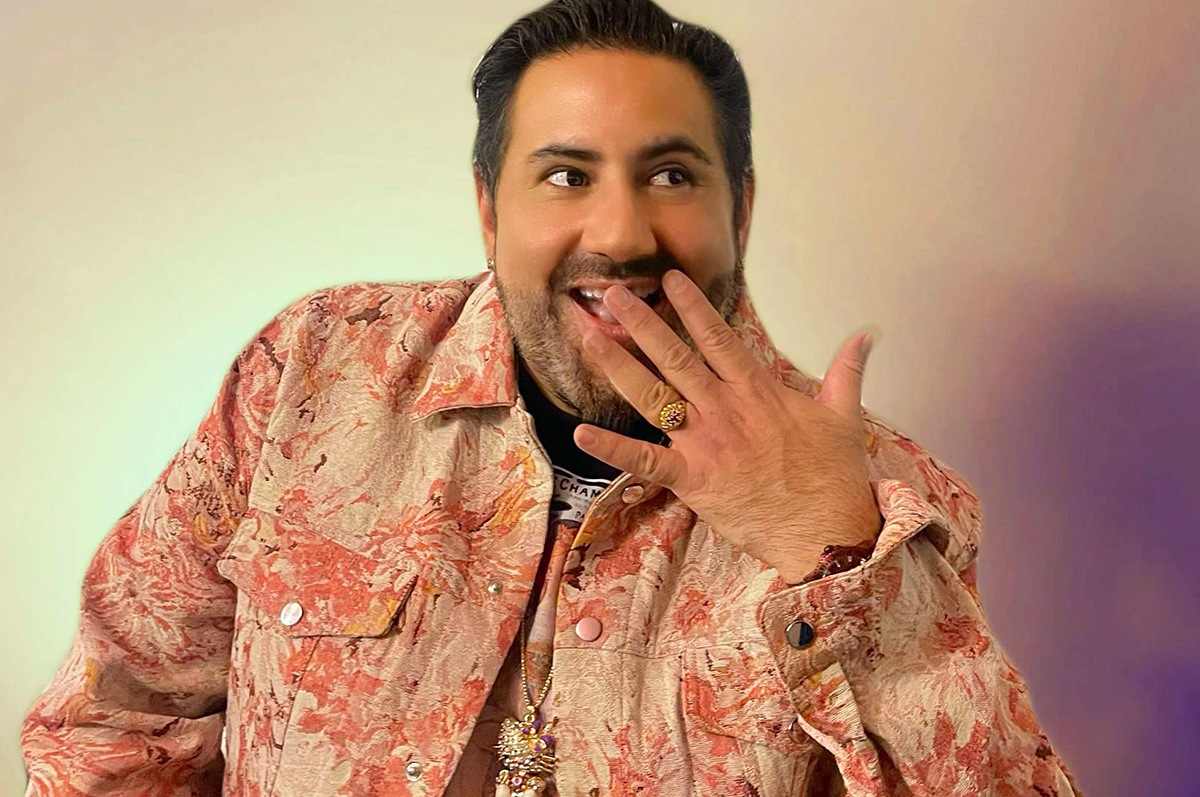
The Los Angeles Blade, Southern California’s leading LGBTQ news outlet, today announced the appointment of a new publisher, Alexander Rodriguez.
Rodriguez has a long background in queer media, business development, and a deep commitment to the Los Angeles community. He has worked as a lead writer and podcast host for Metrosource Magazine and for GED Magazine; content director for FleshBot Gay; and as host and producer for the “On the Rocks” podcast. On the business side, Rodriguez spent years working in business development in the banking industry throughout Los Angeles. He also has an extensive background in event planning and management and has served on the boards of many LGBTQ non-profits. As a TV and radio personality, he has served as emcee for LGBTQ events around the nation.
“I’m excited to bring my diverse media and business experience to the Los Angeles Blade,” Rodriguez said. “We will continue the Blade’s mission of serving as our community’s news outlet of record during these challenging times and work toward building bridges within our community and beyond.”
Rodriguez starts in his new role on Monday, Feb. 3.
“We are thrilled to welcome Alexander to the Blade team,” said Kevin Naff, one of the owners of the Los Angeles Blade. “His multimedia and business side experience will help us grow the Blade in L.A. and continue our commitment to best-in-class journalism serving the LGBTQ community in Southern California.”
Rodriguez becomes the Los Angeles Blade’s second publisher following the unexpected death of founding publisher Troy Masters in December. Masters served in the role for nearly eight years. The community will come together for a celebration of Masters’s life on Monday, Feb. 10, 7-9 p.m. at the Abbey.
“Troy’s legacy is in good hands with Alexander at the helm alongside our new local news editor, Gisselle Palomera,” Naff added.
The Los Angeles Blade, launched in 2017, celebrates its eighth anniversary in March. It is the sister publication of the Washington Blade, founded in 1969, which offers unmatched coverage of queer political news and is the only LGBTQ outlet in the White House press pool and the White House Correspondents’ Association, and the only LGBTQ outlet with a dedicated seat in the White House briefing room.
Alexander Rodriguez can be reached at [email protected].
Los Angeles
Broadway Cares/Equity Fights AIDS donates $500K to wildfire relief effort
Four local organizations received emergency grants

Broadway Cares/Equity Fights AIDS on Monday announced it has awarded $500,000 in emergency grants to organizations that are responding to the Los Angeles wildfires.
A press release notes the Entertainment Community Fund received $250,000, the California Fire Foundation Wildfire and Disaster Relief Fund received $100,000, the Los Angeles Regional Food Bank received $100,000, and Project Angel Food received $50,000.
“All of these organizations are providing much-needed, on-the-ground support for residents and first responders,” said Broadway Cares/Equity Fights AIDS.
“Our compassionate community knows the power of coming together in times of need,” added Broadway Cares Executive Director Danny Whitman. “Because of the generosity of the theater community — those onstage, backstage and in the audience — these emergency grants will immediately provide meals, shelter, medical care, clothing and emergency financial assistance, all first steps on the long road toward recovering, rebuilding, and healing.”
Los Angeles
The dedicated life and tragic death of gay publisher Troy Masters
‘Always working to bring awareness to causes larger than himself’

Troy Masters was a cheerleader. When my name was called as the Los Angeles Press Club’s Print Journalist of the Year for 2020, Troy leapt out of his seat with a whoop and an almost jazz-hand enthusiasm, thrilled that the mainstream audience attending the Southern California Journalism Awards gala that October night in 2021 recognized the value of the LGBTQ community’s Los Angeles Blade.
That joy has been extinguished. On Wednesday, Dec. 11, after frantic unanswered calls from his sister Tammy late Monday and Tuesday, Troy’s longtime friend and former partner Arturo Jiminez did a wellness check at Troy’s L.A. apartment and found him dead, with his beloved dog Cody quietly alive by his side. The L.A. Coroner determined Troy Masters died by suicide. No note was recovered. He was 63.
Considered smart, charming, committed to LGBTQ people and the LGBTQ press, Troy’s inexplicable suicide shook everyone, even those with whom he sometimes clashed.
Troy’s sister and mother – to whom he was absolutely devoted – are devastated. “We are still trying to navigate our lives without our precious brother/son. I want the world to know that Troy was loved and we always tried to let him know that,” says younger sister Tammy Masters.
Tammy was 16 when she discovered Troy was gay and outed him to their mother. A “busy-body sister,” Tammy picked up the phone at their Tennessee home and heard Troy talking with his college boyfriend. She confronted him and he begged her not to tell.
“Of course, I ran and told Mom,” Tammy says, chuckling during the phone call. “But she – like all mothers – knew it. She knew it from an early age but loved him unconditionally; 1979 was a time [in the Deep South] when this just was not spoken of. But that didn’t stop Mom from being in his corner.”
Mom even marched with Troy in his first Gay Pride Parade in New York City. “Mom said to him, ‘Oh, my! All these handsome men and not one of them has given me a second look! They are too busy checking each other out!” Tammy says, bursting into laughter. “Troy and my mother had that kind of understanding that she would always be there and always have his back!
“As for me,” she continues, “I have lost the brother that I used to fight for in any given situation. And I will continue to honor his cause and lifetime commitment to the rights and freedom for the LGBTQ community!”
Tammy adds: “The outpouring of love has been comforting at this difficult time and we thank all of you!”
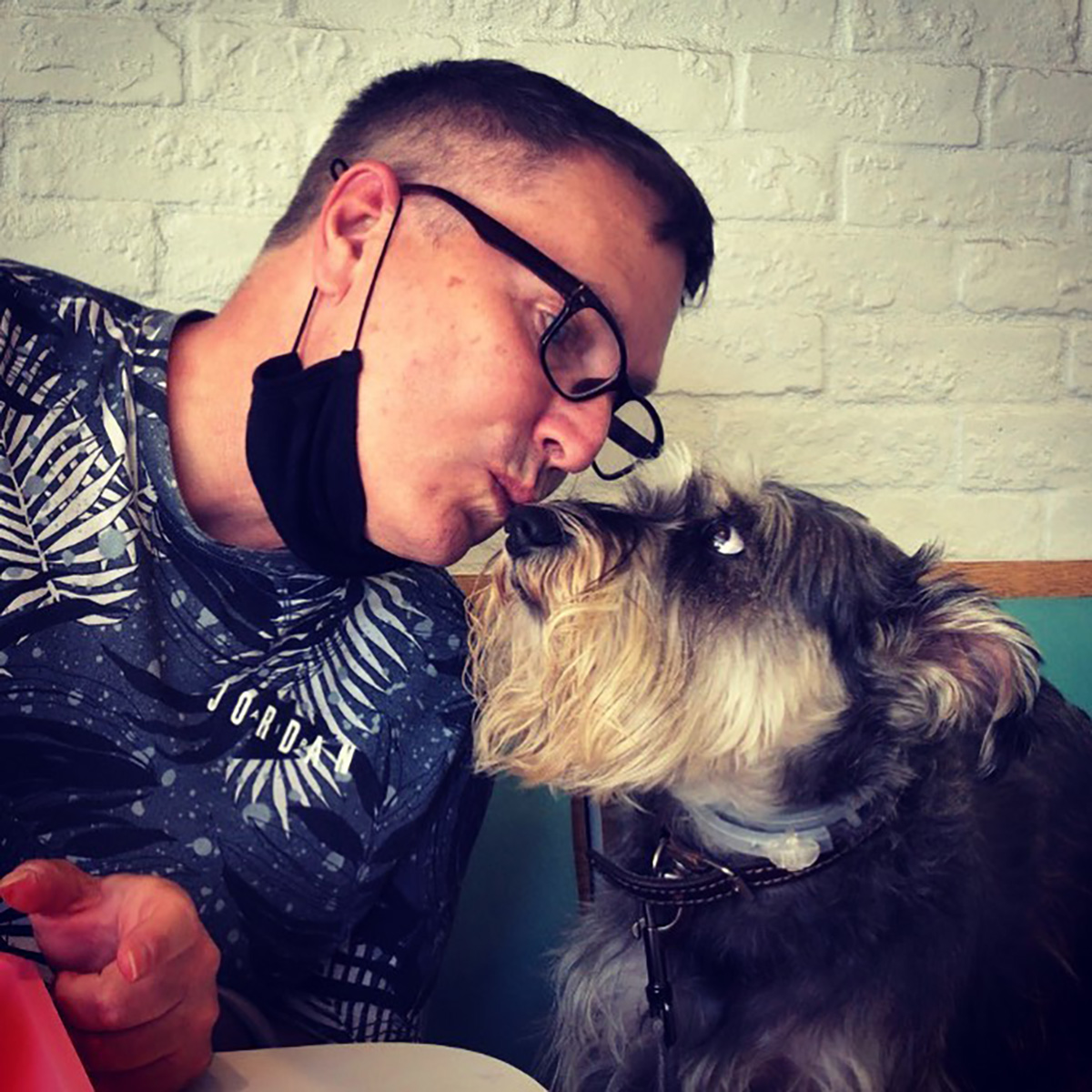
No one yet knows why Troy took his life. We may never know. But Troy and I often shared our deeply disturbing bouts with drowning depression. Waves would inexplicitly come upon us, triggered by sadness or an image or a thought we’d let get mangled in our unresolved, inescapable past trauma.
We survived because we shared our pain without judgment or shame. We may have argued – but in this, we trusted each other. We set everything else aside and respectfully, actively listened to the words and the pain within the words.
Listening, Indian philosopher Krishnamurti once said, is an act of love. And we practiced listening. We sought stories that led to laughter. That was the rope ladder out of the dark rabbit hole with its bottomless pit of bullying and endless suffering. Rung by rung, we’d talk and laugh and gripe about our beloved dogs.
I shared my 12 Step mantra when I got clean and sober: I will not drink, use or kill myself one minute at a time. A suicide survivor, I sought help and I urged him to seek help, too, since I was only a loving friend – and sometimes that’s not enough.
(If you need help, please reach out to talk with someone: call or text 988 Suicide and Crisis Lifeline. They also have services in Spanish and for the deaf.)
In 2015, Troy wrote a personal essay for Gay City News about his idyllic childhood in the 1960s with his sister in Nashville, where his stepfather was a prominent musician. The people he met “taught me a lot about having a mission in life.”
During summers, they went to Dothan, Ala., to hang out with his stepfather’s mother, Granny Alabama. But Troy learned about “adult conversation — often filled with derogatory expletives about Blacks and Jews” and felt “my safety there was fragile.”
It was a harsh revelation. “‘Troy is a queer,’ I overheard my stepfather say with energetic disgust to another family member,” Troy wrote. “Even at 13, I understood that my feelings for other boys were supposed to be secret. Now I knew terror. What my stepfather said humiliated me, sending an icy panic through my body that changed my demeanor and ruined my confidence. For the first time in my life, I felt depression and I became painfully shy. Alabama became a place, not of love, not of shelter, not of the magic of family, but of fear.”
At the public pool, “kids would scream, ‘faggot,’ ‘queer,’ ‘chicken,’ ‘homo,’ as they tried to dunk my head under the water. At one point, a big crowd joined in –– including kids I had known all my life –– and I was terrified they were trying to drown me.
“My depression became dangerous and I remember thinking of ways to hurt myself,” Troy wrote.
But Troy Masters — who left home at 17 and graduated from the University of Tennessee at Knoxville — focused on creating a life that prioritized being of service to his own intersectional LGBTQ people. He also practiced compassion and last August, Troy reached out to his dying stepfather. A 45-minute Facetime farewell turned into a lovefest of forgiveness and reconciliation.
Troy discovered his advocacy chops as an ad representative at the daring gay and lesbian activist publication Outweek from 1989 to 1991.
“We had no idea that hiring him would change someone’s life, its trajectory and create a lifelong commitment” to the LGBTQ press, says Outweek’s co-founder and former editor-in-chief Gabriel Rotello, now a TV producer. “He was great – always a pleasure to work with. He had very little drama – and there was a lot of drama at Outweek. It was a tumultuous time and I tended to hire people because of their activism,” including Michelangelo Signorile, Masha Gessen, and Sarah Pettit.
Rotello speculates that because Troy “knew what he was doing” in a difficult profession, he was determined to launch his own publication when Outweek folded. “I’ve always been very happy it happened that way for Troy,” Rotello says. “It was a cool thing.”
Troy and friends launched NYQ, renamed QW, funded by record producer and ACT UP supporter Bill Chafin. QW (QueerWeek) was the first glossy gay and lesbian magazine published in New York City featuring news, culture, and events. It lasted for 18 months until Chafin died of AIDS in 1992 at age 35.
The horrific Second Wave of AIDS was peaking in 1992 but New Yorkers had no gay news source to provide reliable information at the epicenter of the epidemic.
“When my business partner died of AIDS and I had to close shop, I was left hopeless and severely depressed while the epidemic raged around me. I was barely functioning,” Troy told VoyageLA in 2018. “But one day, a friend in Moscow, Masha Gessen, urged me to get off my back and get busy; New York’s LGBT community was suffering an urgent health care crisis, fighting for basic legal rights and against an increase in violence. That, she said, was not nothing and I needed to get back in the game.”
It took Troy about two years to launch the bi-weekly newspaper LGNY (Lesbian and Gay New York) out of his East Village apartment. The newspaper ran from 1994 to 2002 when it was re-launched as Gay City News with Paul Schindler as co-founder and Troy’s editor-in-chief for 20 years.

“We were always in total agreement that the work we were doing was important and that any story we delved into had to be done right,” Schindler wrote in Gay City News.
Though the two “sometimes famously crossed swords,” Troy’s sudden death has special meaning for Schindler. “I will always remember Troy’s sweetness and gentleness. Five days before his death, he texted me birthday wishes with the tag, ‘I hope you get a meaningful spanking today.’ That devilishness stays with me.”
Troy had “very high EI (Emotional Intelligence), Schindler says in a phone call. “He had so much insight into me. It was something he had about a lot of people – what kind of person they were; what they were really saying.”
Troy was also very mischievous. Schindler recounts a time when the two met a very important person in the newspaper business and Troy said something provocative. “I held my breath,” Schindler says. “But it worked. It was an icebreaker. He had the ability to connect quickly.”
The journalistic standard at LGNY and Gay City News was not a question of “objectivity” but fairness. “We’re pro-gay,” Schindler says, quoting Andy Humm. “Our reporting is clear advocacy yet I think we were viewed in New York as an honest broker.”
Schindler thinks Troy’s move to Los Angeles to jump-start his entrepreneurial spirit and reconnect with Arturo, who was already in L.A., was risky. “He was over 50,” Schindler says. “I was surprised and disappointed to lose a colleague – but he was always surprising.”
“In many ways, crossing the continent and starting a print newspaper venture in this digitally obsessed era was a high-wire, counter-intuitive decision,” Troy told VoyageLA. “But I have been relentlessly determined and absolutely confident that my decades of experience make me uniquely positioned to do this.”
Troy launched The Pride L.A. as part of the Mirror Media Group, which publishes the Santa Monica Mirror and other Westside community papers. But on June 12, 2016, the day of the Pulse Nightclub shooting in Orlando, Fla., Troy said he found MAGA paraphernalia in a partner’s office. He immediately plotted his exit. On March 10, 2017, Troy and the “internationally respected” Washington Blade announced the launch of the Los Angeles Blade.

In a March 23, 2017 commentary promising a commitment to journalistic excellence, Troy wrote: “We are living in a paradigm shifting moment in real time. You can feel it. Sometimes it’s overwhelming. Sometimes it’s toxic. Sometimes it’s perplexing, even terrifying. On the other hand, sometimes it’s just downright exhilarating. This moment is a profound opportunity to reexamine our roots and jumpstart our passion for full equality.”
Troy tried hard to keep that commitment, including writing a personal essay to illustrate that LGBTQ people are part of the #MeToo movement. In “Ending a Long Silence,” Troy wrote about being raped at 14 or 15 by an Amtrak employee on “The Floridian” traveling from Dothan, Ala., to Nashville.
“What I thought was innocent and flirtatious affection quickly turned sexual and into a full-fledged rape,” Troy wrote. “I panicked as he undressed me, unable to yell out and frozen by fear. I was falling into a deepening shame that was almost like a dissociation, something I found myself doing in moments of childhood stress from that moment on. Occasionally, even now.”
From the personal to the political, Troy Masters tried to inform and inspire LGBTQ people.
Richard Zaldivar, founder and executive director of The Wall Las Memorias Project, enjoyed seeing Troy at President Biden’s Pride party at the White House.
“Just recently he invited us to participate with the LA Blade and other partners to support the LGBTQ forum on Asylum Seekers and Immigrants. He cared about underserved community. He explored LGBTQ who were ignored and forgotten. He wanted to end HIV; help support people living with HIV but most of all, he fought for justice,” Zaldivar says. “I am saddened by his loss. His voice will never be forgotten. We will remember him as an unsung hero. May he rest in peace in the hands of God.”
Troy often featured Bamby Salcedo, founder, president/CEO of TransLatina Coalition, and scores of other trans folks. In 2018, Bamby and Maria Roman graced the cover of the Transgender Rock the Vote edition.
“It pains me to know that my dear, beautiful and amazing friend Troy is no longer with us … He always gave me and many people light,” Salcedo says. “I know that we are living in dark times right now and we need to understand that our ancestors and transcestors are the one who are going to walk us through these dark times… See you on the other side, my dear and beautiful sibling in the struggle, Troy Masters.”
“Troy was immensely committed to covering stories from the LGBTQ community. Following his move to Los Angeles from New York, he became dedicated to featuring news from the City of West Hollywood in the Los Angeles Blade and we worked with him for many years,” says Joshua Schare, director of Communications for the City of West Hollywood, who knew Troy for 30 years, starting in 1994 as a college intern at OUT Magazine.
“Like so many of us at the City of West Hollywood and in the region’s LGBTQ community, I will miss him and his day-to-day impact on our community.”

“Troy Masters was a visionary, mentor, and advocate; however, the title I most associated with him was friend,” says West Hollywood Mayor John Erickson. “Troy was always a sense of light and working to bring awareness to issues and causes larger than himself. He was an advocate for so many and for me personally, not having him in the world makes it a little less bright. Rest in Power, Troy. We will continue to cause good trouble on your behalf.”
Erickson adjourned the WeHo City Council meeting on Monday in his memory.
Masters launched the Los Angeles Blade with his partners from the Washington Blade, Lynne Brown, Kevin Naff, and Brian Pitts, in 2017.
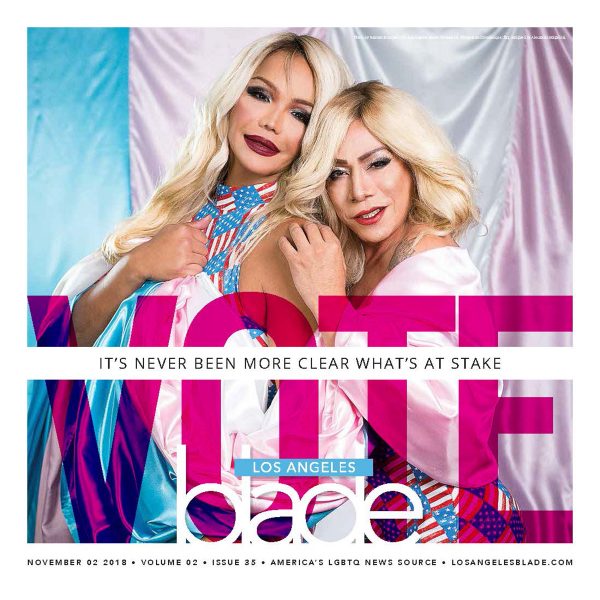
“Troy’s reputation in New York was well known and respected and we were so excited to start this new venture with him,” says Naff. “His passion and dedication to queer LA will be missed by so many. We will carry on the important work of the Los Angeles Blade — it’s part of his legacy and what he would want.”
AIDS Healthcare Foundation President Michael Weinstein, who collaborated with Troy on many projects, says he was “a champion of many things that are near and dear to our heart,” including “being in the forefront of alerting the community to the dangers of Mpox.”
“All of who he was creates a void that we all must try to fill,” Weinstein says. “His death by suicide reminds us that despite the many gains we have made, we’re not all right a lot of the time. The wounds that LGBT people have experienced throughout our lives are yet to be healed even as we face the political storm clouds ahead that will place even greater burdens on our psyches.”
May the memory and legacy of Troy Masters be a blessing.
Veteran LGBTQ journalist Karen Ocamb served as the news editor and reporter for the Los Angeles Blade.
Los Angeles
Los Angeles Blade publisher Troy Masters dies at 63
Longtime advocate for LGBTQ equality, queer journalism
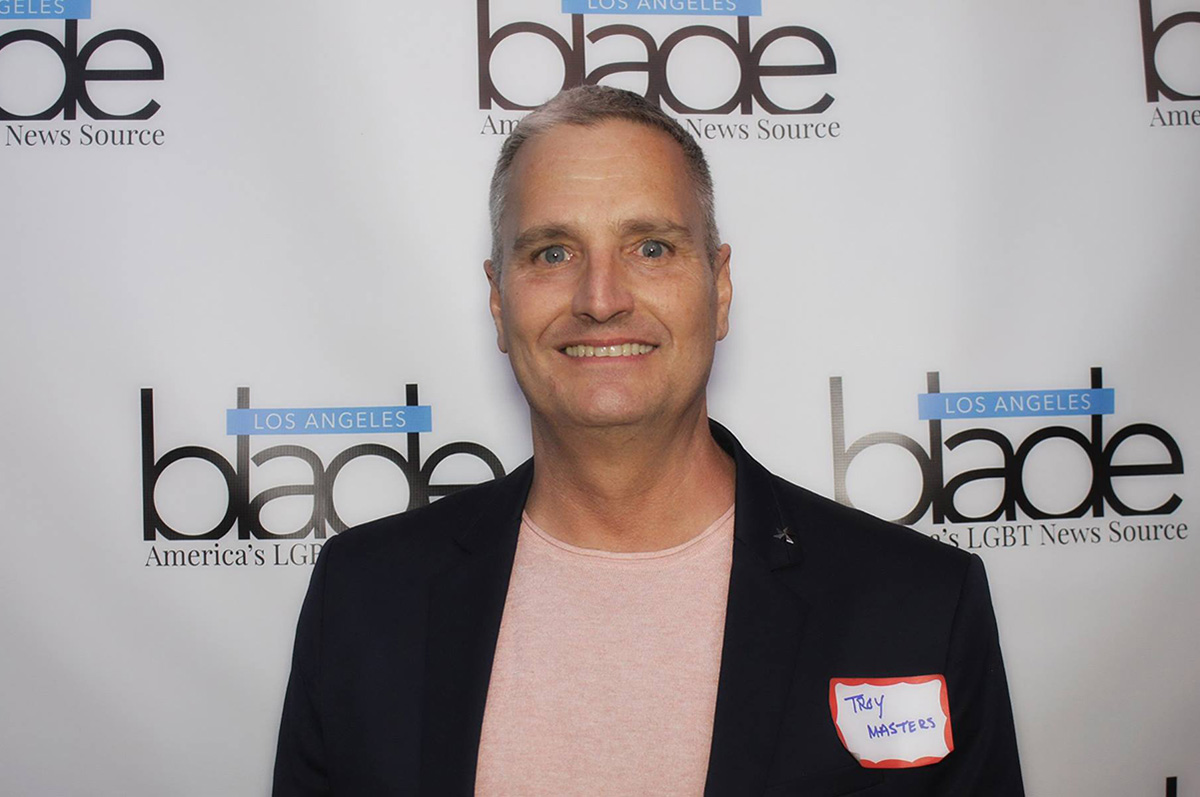
Troy Masters, publisher of the Los Angeles Blade, died unexpectedly on Wednesday Dec. 11, according to a family member. He was 63. The cause of death was not immediately released.
Masters is a well-respected and award-winning journalist and publisher with decades of experience, mostly in LGBTQ media. He founded Gay City News in New York City in 2002 and relocated to Los Angeles in 2015. In 2017, he became the founding publisher of the Los Angeles Blade, a sister publication of the Washington Blade, the nation’s oldest LGBTQ newspaper.
His family released a statement to the Blade on Thursday.
“We are shocked and devastated by the loss of Troy,” the statement says. “He was a tireless advocate for the LGBTQ community and leaves a tremendous legacy of fighting for social justice and equality. We ask for your prayers and for privacy as we mourn this unthinkable loss. We will announce details of a celebration of life in the near future.”
The Blade management team released the following statement on Thursday:
“All of us at the Los Angeles Blade and Washington Blade are heartbroken by the loss of our colleague. Troy Masters is a pioneer who championed LGBTQ rights as well as best-in-class journalism for our community. We will miss his passion and his tireless dedication to the Los Angeles queer community.
“We would like to thank the readers, advertisers, and supporters of the Los Angeles Blade, which will continue under the leadership of our local editor Gisselle Palomera, the entire Blade family in D.C. and L.A., and eventually under a new publisher.”
Troy Masters was born April 13, 1961 and is survived by his mother Josie Kirkland and his sister Tammy Masters, along with many friends and colleagues across the country. This is a developing story and will be updated as more details emerge.

Los Angeles
Ysabel Jurado claims victory: A new era for Los Angeles City Council District 14
The LGBTQ+ candidate maintained steady lead over incumbent Kevin De León, eventually declaring victory
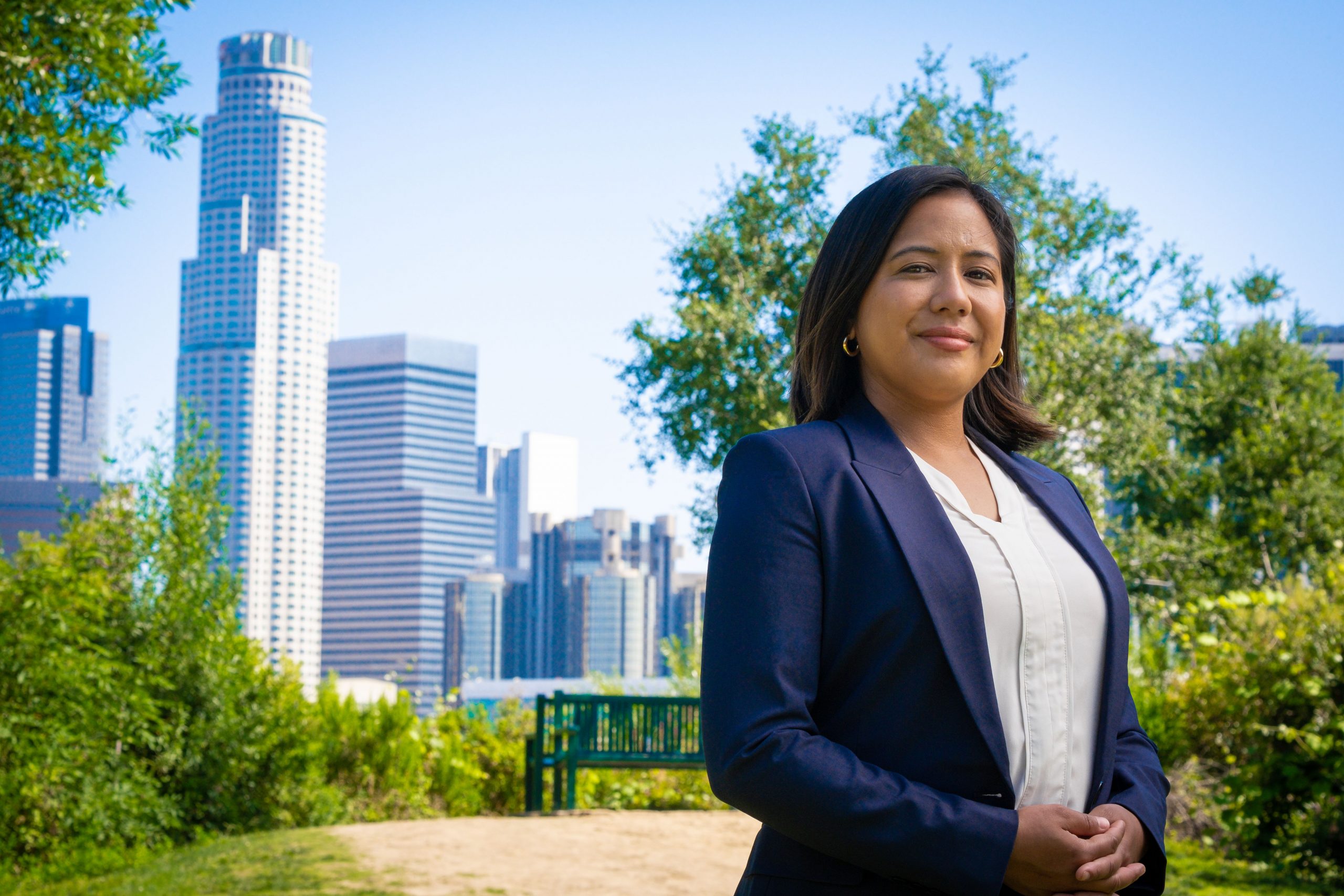
Ysabel Jurado, the Highland Park resident and tenants rights’ attorney, is now Councilmember of Council District 14 after a battle for the hot seat against incumbent Kevin De León.
“Today, I am humbled to officially declare victory in the race for Los Angeles City Council District 14. This win is not mine—it belongs to our community,” said Jurado shortly after the win was announced.
Jurado makes history as the first Filipino American to serve on the Council and has expanded LGBTQ+ and women’s representation too.
In her celebratory statement after Thursday’s win, she stated that De León used Trump-like tactics and she is glad the city did not play into it.
“Trumpism has no place in CD-14– and we proved that by resoundingly rejecting the divisive tactics deployed by our opponent–tactics adopted directly from the Trump playbook,” said Jurado. “Like Trump, our opponent thumbed his nose at the law—from his racist gerrymandering scandal that likely violated the Voting Rights Act– to the current open investigation into his campaign for money laundering.”
Jurado is the new hope for a city that has been marred by racial and phobic remarks by those previously and still in positions of power.
Other news outlets are reporting that this marks another fallen Latino leader after the leaked L.A. City Council audio recording went viral in 2021 and led to the resignation of Los Angeles City Council president Nury Martínez.
De León’s goal during his term was to retain and expand Latin American political power.
With De León out, that leaves Latin Americans taking up only four out of the Council’s 15 seats, in a city that has a majority Latin American population. The city’s biggest Mexican American communities like Boyle Heights and El Sereno will not have a Latin American leader for the first time in nearly 40 years.
During De León’s campaign, he urged voters that if Jurado were to be elected, it would come at the expense of Latin American voices.
Last month, Eastside voters received a text message from De León’s campaign saying: ‘Forty years of Latino political power is under threat.’
Jurado secured her victory after placing first in the March primary, with support from Latin American politicians like Councilmember Hugo Soto-Martínez, L.A. Unified School District trustee Rocio Rivas, L.A. County Supervisor Hilda Solis and Councilmember Eunisses Hernandez, who replaced incumbent Gil Cedillo after he was also caught on audio making racist and defamatory remarks.
“These are heavy times, but Ysabel Jurado’s win is an incredible cause for hope,” said Hernandez in a congratulatory post on Instagram. “She has proven again and again that our city has not just the capacity to dream of a better future for ourselves, but that we demand it.”
De León tapped into the pathos of Eastside residents during his campaign, resorting to political tactics that attacked Jurado directly, rather than tackling the key issues at hand.
“Like Trump, he relied upon fear mongering, red-baiting, misogyny, and racial dog-whistling in an effort to divide us. But unlike Trump, his tactics failed.”
-

 Breaking News1 day ago
Breaking News1 day agoMajor victory for LGBTQ funding in LA County
-

 Features1 day ago
Features1 day agoKoaty & Sumner: Finding love in the adult industry
-

 a&e features4 days ago
a&e features4 days agoLatina Turner comes to Bring It To Brunch
-

 Books3 days ago
Books3 days agoTwo new books on dining out LGBTQ-style
-

 Television5 days ago
Television5 days ago‘White Lotus,’ ‘Severance,’ ‘Andor’ lead Dorian TV Awards noms
-

 El Salvador1 day ago
El Salvador1 day agoLa marcha LGBTQ+ desafía el silencio en El Salvador
-

 Miscellaneous12 hours ago
Miscellaneous12 hours agoCan you really find true love in LA? Insights from a queer matchmaker
-

 Arts & Entertainment12 hours ago
Arts & Entertainment12 hours agoIntuitive Shana gives us her hot take for July’s tarot reading

